
WISDOM OF CROWDS – Flowing Through You
Anthony Morgan
June 2013
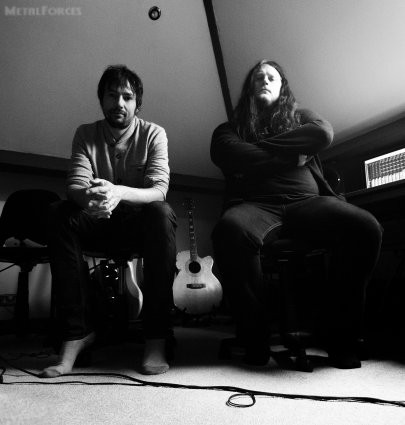
|
Progressive outfit Wisdom Of Crowds is the brainchild of Kscope Music staff member Johnny Wilkes. Authoring ‘pretty rough ideas’, Johnny emailed The Pineapple Thief vocalist / guitarist Bruce Soord with the hope of forming a collaboration. The email in question was sent shortly after The Pineapple Thief had inked a record contract with Kscope, the progressive label emerging in May 2008.
“Johnny said ‘Hey Bruce… Do you fancy doing some music?,’” Bruce remembers. “I said ‘Yeah… What the hell.’ He sent me through these sketches that were little riffs, chords, words, and melodies. I took them, and I think the first song that we ever did was ‘Pleasure’. I re-recorded the whole thing; I played all of the instruments, and turned them into a song. This was about four years ago, but we could never nail the vocals. For four years, it was just gestating as a sort of weird project that I would dip into every couple of months. It’s only recently when Jonas agreed to come aboard that the whole thing came together. It was a weird thing. No thought really went into it – it just evolved, and happened on its own.”
The involvement of Katatonia vocalist Jonas Renkse wasn’t premeditated, despite press reports to the contrary. “No, it wasn’t,” the composer concedes. “I know that Kscope had their little marketing spiel where they said that the music was always written with Jonas’ voice in mind. Jonas was definitely number one when we knew that we had to get a vocalist, because it didn’t suit my vocal. I think that when I write for The Pineapple Thief, I do write to suit the style of my singing. For this though it was just really hard, and quite edgy in places. With my voice, it just didn’t sit right. Not that I was ever gonna sing, but even when I was doing back-up vocals it just didn’t sound right. Also, I just thought that anything which resembled the sound of my voice would just make it too similar… Not too similar to The Pineapple Thief, but I wanted it to be totally separate. I quite enjoyed just focusing on especially the guitar to express myself instead of the vocals.
“The guy who I did the music with originally at Kscope, it didn’t suit his voice either. It was always a sticking point, and Kscope weren’t interested in it without a strong vocal. Jonas was always number one for me as the perfect voice to fit, even though a lot of people went ‘Are you sure? Katatonia are a metal band.’ Jonas doesn’t sing like that, though; he’s not a screamer, or anything like that. It was only 2013 I think when it all came together. I think if Jonas hadn’t had come onboard, the project would never have been finished.”
Approached to supply vocals to Wisdom Of Crowd’s material, Jonas’ reaction was favourable. “Jonas is so chilled out that he said ‘Yeah. This would be great; let’s do it,’ but the trouble is that Jonas and Katatonia are always on the road,” Bruce laments. “I think when we first approached him, Katatonia were in the States with Devin Townsend and Paradise Lost where they played loads of dates. It just so happened that they came back, and Jonas had a window in January 2013 where he could fly over to my studio and sing. It was just luck really that he had the time to come and do it. I don’t think he knew how it would turn out, because we had never met before. It was just one of those ‘Well, let’s see what happens.’ Luckily, it turned out alright.”
Certain metal artists prove unwilling to tread outside of their comfort zone and venture beyond the metal template, though Jonas doesn’t fall into this category. “Yeah,” the axeman concurs. “The funny thing about Jonas is when he stayed in my house for about a week when he was doing the singing, he’s got such eclectic music tastes. The stuff that he was playing me… We would always fight over Spotify, and he was teaching me about all of the great Swedish music. One of his favourite acts is about the softest, folkiest music that you’d ever hear. You look at Jonas with all of the long hair and dark, black clothing – the goth look – but then you realise that actually he’s got really varied and wide tastes.”
Particular metal fanatics can prove to be more closed-minded. “I think you can find that in any genre,” Bruce supplements. “Funnily enough, I was talking to some other people about that. The Metallica fans out there, if they don’t want Metallica then they want Slayer. They’re not gonna like what we’ve done, but I think in every genre there are people who can be closed-minded. There are people who can appreciate this music, though. Like you said mind, there are gonna be some metalheads who just like their metal and nothing else. I grew up in the progressive rock scene, and there are some massive prog rock fans where all they want is just prog rock – long songs. I’ve always been used to a mixed reaction in my musical career, I think.”
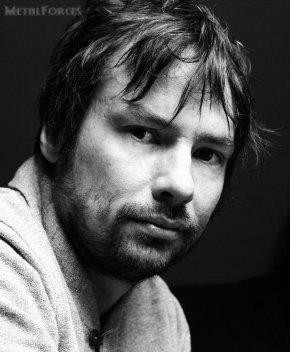
|
Prior to Wisdom Of Crowd’s formation, the duo weren’t acquainted. “Funnily enough, I remember when I first joined Kscope,” the engineer reminisces. “I had nicked a load of stuff. When I heard Katatonia, I was so blown away by the music. I remember emailing Jonas – it must’ve been back in 2007. I think it was The Great Cold Distance (March 2006) back then, and I just told him how much I loved his voice. It has such a distinctive sound. I remember him replying, but since then we’ve never spoken or seen each other. When he came down to stay with me for a week and do the singing, that was the first time really that we had met. I’d probably say that we were both a little bit apprehensive, because no-one knew what it would turn out like – how we’d get on, or anything like that. Luckily though, it just all fell together really easily.”
The pair’s musical association has since blossomed into a friendship. “Jonas nailed the songs so quickly, but that was the other nervous thing,” Bruce notes. “The first time you go into a studio, you think ‘How is this gonna go?’ Half of me was expecting it to be a really long, hard session where you were battling to get the vocals right, but he just nailed it. I think the most we ever did was about five takes, and so a hard day in the studio was like a four-hour session. The rest of the time we’d spend sharing stories, playing music, drinking some beer, and cooking food. I think Jonas said it was like a vacation, but a really creative one.”
The name of Johnny Wilkes remains conspicuously absent from press releases, however. “He’s very, very low-key, and he wants it to stay that way,” the axe-slinger explains. “Obviously he works at the label, so he’s really like a silent partner. I think the best way to describe it is he started the sketches. The little seedlings started with Johnny, and then he gave it to me. I then did the rest, and Jonas did a massive piece of the jigsaw at the end. I think that way, it made the journey go somewhere completely different than what I do with The Pineapple Thief. I think that was the key.”
Under the Wisdom Of Crowds banner, Bruce dons various hats. “I engineered it, mixed it, and played everything on it apart from the singing – my keyboard player (Steve Kitch) did a few nice synths, as well,” he discloses. “Generally though, it was almost like I did everything and Jonas sang. That’s almost how it panned out. Luckily, because I’ve developed quite a nice studio and built up a nice library of sounds, I had a big sonic arsenal, basically. That sonic arsenal was untapped, because I couldn’t use those sounds with The Pineapple Thief. It was lots of years of influences ready for me to unleash, I think.”
Jonas’ duties were limited to stepping behind the microphone. “I think Jonas would admit that he came to the party quite late,” the programmer acknowledges. “All the music was done, and we had some guide vocals so he could get an idea of the melody. What he brought? Again, I just can’t understate how much he finished the record just by virtue of his vocals and the style. He added a lot of little melodic tricks; he put his own stamp on all of the harmonies, and the melodies. I just basically let him get on with however he wanted to sing it, and luckily everything that he did sounded really good. Even though strictly speaking all he did was turn up and sing on the record, his input and influence on the final thing was huge.”
Wisdom Of Crowds’ moniker was adopted at the suggestion of Kscope. “Wisdom Of Crowds is actually the name of a book (2004, by James Surowiecki), but it’s boring,” Bruce dismisses. “It’s not very rock ’n’ roll. It’s like a business book about the wisdom of crowds. There was me and Jonas as the main architects but there was also Johnny from the label, so really there was three of us involved. The other thing is that Jonas and I are quite similar in how we write, in that we both lock ourselves away and do it in a very solitary way. This is the first time that I’ve done a collaboration that’s worked. I think none of us would have come up with a record that sounds like this if we had done it on our own. It’s almost like the whole was greater than the sum of the parts.”
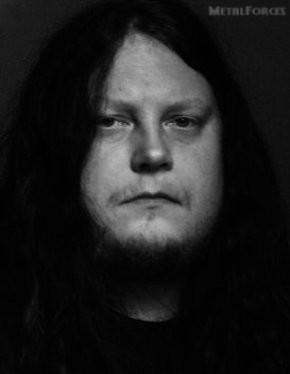
|
Past collaborations had been unsuccessful. “Right when I started my musical career I was in a band called Vulgar Unicorn with a friend of mine, and I think that’s why I started The Pineapple Thief,” the mixer recalls. “I got so frustrated that I couldn’t do what I wanted to do, and it was always a bit of a compromise. I think after nine albums I had gotten that out of my system though, so I think I was probably more receptive and ready to do a collaboration.”
Wisdom Of Crowds’ exact musical style is difficult to pinpoint. “It’s really hard,” Bruce admits. “I remember when we just had a totally open book of songs. As far as production was concerned I was going to focus a lot more on guitars and things like that, but I also wanted to use all of the influences that I had developed over my career – the electronica influences, the break-beat, the trip hop stuff, the industrial sort of influences. I remember in the late 90s when trip hop was big down in this neck of the woods – I live an hour away from Bristol. You then had the Ninja Tune era. Steve my keyboard player was signed to Ninja Tune, so I got quite into all of the sort of breakbeat stuff.
“In fact, I remember in the late 90s me and my mates used to be really into the extreme sort of metal. We were into Nine Inch Nails definitely, but even the old Fear Factory records where they were getting a lot of electronica in with the metal as well. I think all through that period influenced the production – everything from the 90s up until the modern day. It’s difficult to pick one or two artists that were particularly influential, though.
“I think that is probably the best way to describe it; you’ve got the meeting of acoustic and electric guitar with modern electronica, and the darker side of electronica. Down the road we’ll see by the reaction if the whole thing worked or not, but it really was anything went. If I fancied putting a really horribly distorted beat over the music, then I just did.”
An industrial influence is audibly apparent, though by no means can the platter be dubbed an industrial affair. “No, it isn’t,” the guitarist concurs. “It does get quite hard and it does get quite heavy, but yeah, you’re right. It’s not a metal album, but it’s definitely not a prog rock album. It’s kind of… I don’t know. It’s really hard to pinpoint what it sounds like.”
Labels tend to mail records to specialist media outlets for review consideration, records that neatly fall under a specific genre. Albums difficult to categorise are arguably more difficult to market. “That is a danger, whether it just doesn’t find anywhere,” Bruce accepts. “It’s not metal enough to be metal and it’s not prog enough to be prog, but it doesn’t have enough electronica to be just an electronica album either. It’s not break-beat and it’s not an industrial record, so it’s like ‘What is it?’ I guess it’s got elements of Depeche Mode in there sometimes, the way they mix up dark electronica with guitars and vocal. But no, it’s difficult.”
An abstract demeanour underpins the effort’s lyrical preoccupations. “It’s mainly about life and relationships, but in a dark’ish way,” the composer critiques. “We’re talking about desperation, loneliness, separation, death, and all that kind of stuff. I think if you look at the words, it’s pretty dark. That sets it apart from The Pineapple Thief in a way, because even though The Pineapple Thief gets quite dark, there’s always light. There’s always something to grab hold of with The Pineapple Thief, but I think on some of the tracks on this record, it’s almost like ‘Well, look. We’re gonna die. Let’s deal with it, and sing about it.’
“I think that was because of the way the music developed. The music was dark sounding; it had dark synths, and dark beats. I think it just lead the lyrics in that direction. It’s not all doom and gloom, but it does deal with what millions of other people think about day in and day out. People think about how to deal with your mortality, especially when you’re not in any way religious. It’s something that everyone should be able to relate to, regardless of their beliefs.”
Lyrics mainly fell from Bruce’s creative pen. “Johnny would come up with some phrases, like ‘I really like this word’ or ‘… this phrase’ and so on,” he credits. “I’d take that, and let it influence what the song would become about.”
Future subject matter will either be co-written or authored wholesale by Jonas. “I think that’s the plan going forward, because we got on well enough,” the axeman divulges. “If we do some more stuff together, I think Jonas is quite keen to be more of a collaborator as opposed to what his role really was, which was as a vocalist.”
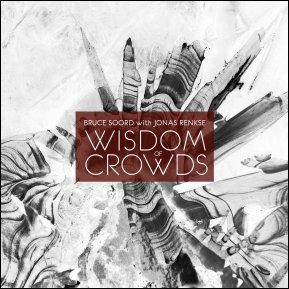
|
The possibility of Bruce travelling to Stockholm, Sweden has been discussed, the meeting potentially scheduled to occur as soon as Jonas’ diary has an open window. “We’d just have a jam, and see what happens,” he tells. “If we did that, it would probably be something very different. It’s really too early to say under what name that would be, or whether Wisdom Of Crowds will be a one-off, or anything like that. We’ll have to see, I think.
“I’ve got a feeling we’ll do another one, though. What I’d like to do next is just call it Wisdom Of Crowds – it doesn’t have to have mine and Jonas’ name on the front. We can then do whatever we like with it, and do a true collaboration next time. The only problem is that Jonas and I might get together and do a really soft acoustic record though, and then we’ll probably have to think of a different name. I would certainly be up for doing another experimental sort of electronica… Whatever the hell you call Wisdom Of Crowds. I’d certainly be up for doing another one.”
Jonas’ commitments are plentiful throughout 2013. “Katatonia are pretty booked up, and then potentially in December Wisdom Of Crowds might be touring as well,” the engineer reveals. “That takes us up until the end of 2013. It’d be early 2014 at the earliest, I think. It’s definitely something that we would like to do. We’ll try the same formula. Johnny plants the seed, I turn it into a tree, and then Jonas comes and puts all of the fruit and flowers on it. So yeah, I think it’s a good formula. It worked really quick as well. It definitely felt like a winning formula, but whether we can repeat that is anybody’s guess.”
Wisdom Of Crowds’ material was cut at Bruce’s own recording facilities. “I’ve already seen some reviews where they pick up on the amount of electronica, especially in the beats and the breaks,” he observes. “Without a big studio, it’s not easy to make live drums sound good. I made a conscious decision to keep this one quite electronic, even though there are still some acoustic drums in there and things like that. But yeah, the whole thing was recorded in my studio, which was good. I could just spend as long as I wanted to, and I think that’s why over four years it didn’t die. I think if we had paid for a recording studio for this, it would’ve died a death a long time ago.
“With a lot of things – vocals and acoustic guitars, for example – you just don’t need to pay for a big studio. Drums you do need to pay a bit of money for; you need to pay for a decent drum room and a lot of nice mikes to get a good drum sound. I’m not a big fan of sampling, and triggering drums. It’s nice to crank up your amps, so that’s the other thing. Putting some nice, big, expensive mikes in front of them, that makes a difference. Generally though, you can get away with an awful lot recording at home.”
Technological advances have paved the way for musicians to record tracks within the confines of a modest budget. “It’s amazing,” the axe-slinger comments. “I haven’t really upgraded the equipment in my studio for a long time, but I think as my skills have gotten better the sounds of the records have just gotten better. You just realise that it’s not the toys you’ve got, but how you use them. I have got decent equipment, but you don’t need much to make a record nowadays.”
Some musicians favour analogue equipment over digital equipment, though Bruce harbours preferences for neither. “I’ve got some analogue,” Bruce shares. “I’ve got good analogue mikes, good analogue pre-amps, and good converters so that it gets into the computer in its best possible state. After that though, the whole thing’s mixed in the box as we say in the trade, which is basically all in a sequencer in a computer. Technology has come on so fast in the last five years. There are a lot of people who advocate tape and things like that, but I think if you listen to the best records that have been mixed in ProTools, they sound just as good as those that’ve been made on tape.”
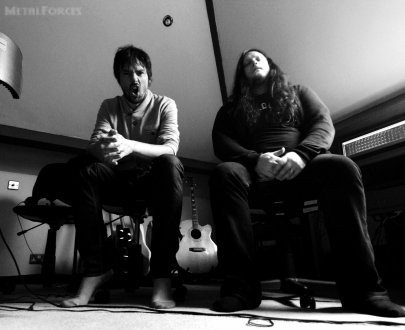
|
ProTools is sometimes exploited by musicians, musicians who produce sounds courtesy of ProTools that they cannot replicate live. “That is true, and it makes you lazy as well,” the programmer discerns. “It’s too easy to cut and paste, and fix stuff in the computer. That’s true, yeah. What you can do with vocal tuning now is ridiculous. It’s so often you hear that story about how the live show is ropy, because they just can’t do what they do in the studio. That’s why we as The Pineapple Thief play it live. The live show is so important that it would just be embarrassing if people turned up and heard a shoddy rendition of a recording.”
Cover artwork duties were handled by Scott Robinson, resident graphic designer at Kscope. “We went through some concepts for the cover, but eventually because of the track ‘Frozen North’ there were those blocks of ice,” Bruce imparts. “Luckily for us, Kscope had the money to pay for some nice mirror foil for the deluxe edition. The deluxe edition looks really nice.”
Helmed by Pele Newell, a music video was created for ‘Frozen North’. “He did his own interpretation, which is some crazy sci-fi thing,” the mixer judges. “You’ve got spaceships flying around, and all kinds of weird things going on. However people interpret it, I don’t mind. How he’s done it for the budget that he was given is absolutely remarkable. Jonas and I you’re never gonna get in the same room that often, so we have to give directors songs and say ‘Interpret it however you want, and make a video.’ Kscope want to do as many videos as possible, but it’s a case of budget. At the moment, I think nobody really knows what this project’s gonna do – how many units it’s gonna sell – so it’s very hard. It’s looking good; they’ve already sold out of the special deluxe editions, so I think the label are very pleased. Fingers crossed.”
Early reactions towards Wisdom Of Crowds’ debut full-length have been complimentary. “It’s early days, but we’re definitely getting some really good press from what I’ve seen,” Bruce recognises. “I must confess, I don’t like to go online because it’s a free for all. You do get a lot of nasty, vitriolic people out there who just wanna write hateful things. Kscope are always up for putting teasers out there, and I think we’ve got some tracks out on YouTube. The thing with YouTube is it’s really easy to write stuff. People have been going ‘Wow, this is great,’ and are really surprised about the collaboration. I don’t think anyone expected me and Jonas to get together, but it seems that people are really excited about it. So, fingers crossed. It might find a little niche.”
At The Garage in London on July 24th and 25th, Kscope will mark its fifth anniversary. The first evening will include Wisdom Of Crowds’ inaugural live performance. “It’s gonna be a real ball-ache to get the live band together,” the guitarist complains. “We’ll be a four-piece, and there are three of us who will prepare in the rehearsal studio. It’s me, Jonas obviously, and then we’ve got a drummer from Brighton called Dan who no-one will know. He’s a very good drummer though, and then there’s Steve my keyboard player from The Pineapple Thief. He’s got the rig, he’s got all of the big, fat sounds, and he’s cheap (laughs). It’s gonna be quite a challenge to get Wisdom Of Crowds on the road without it being just a horrible backing track, so I’m hoping we’ll be touring again in December – a European tour.”
Whether the ensemble’s debut live outing will be recorded has yet to be decided. “I’ll have to speak to Kscope,” Bruce muses. “I think they’ll probably get some people to video it. I hope so, because it will be a real one-off.”
Writing sessions in aid of The Pineapple Thief’s tenth studio full-length are underway. “That’s what we’re focusing on for the rest of 2013, rehearsing and recording that,” the lyricist informs. “I’ve been writing since January, actually. At the moment we haven’t actually played any of the new stuff, so I’m locking myself in my studio as much as I can to write. It does take me a long time; I do find that for every decent song, I have probably about four or five rubbish ones that have to be binned. It’s funny, because you always learn something from these rubbish songs. You think it’s a waste of time, but it’s not. There’s always maybe a melody or a chorus, so you’ll take it and completely rework it. All of a sudden, it’ll then just work. I can’t put my finger on it, but it’s definitely a case of a lot of hard work is required.
“I think Jonas is talking about another Bloodbath album, so he’s gonna be busy. So yeah, that’s really it. I think that’s the focus for both of us really, Katatonia for Jonas and for me The Pineapple Thief. It’s still gonna be really interesting to see how this project turns out, though.”
At the time of writing, roughly half an album’s worth of material has been penned. “I’ve certainly written probably enough to do a double-album to be honest, but it wouldn’t be a very good one,” Bruce confesses. “Yeah though, I’ve got about five songs that have turned out really well. The band have got a veto and they’ve all put their thumbs up to them, so we’re halfway there. At least I know that I’ve got half a good album. It’s gonna come out in 2014.”
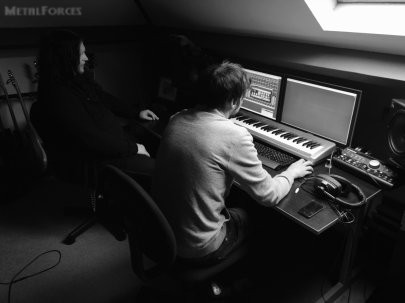
|
The aforementioned new tunes convey “more of a band feel. It’s definitely a step forward. At the moment, I’m not sure if I’m… The last album was quite big sounding, and we had a big string section. I think this next one will be a lot less of the big sounds. If there are strings on it, it’ll be more of a close-sounding string section – I’ve learnt a lot from working with an orchestra. I think next time it’ll be a lot more organic sounding. I hate to use that word, but it’ll be where you can hear the orchestra or the string section working. Generally though, because we’ve developed so much as a live band, I’m really writing with the band in mind. We can then take the songs and just play them as a four-piece, and without needing to worry about too much production.”
Bruce’s vocal prowess has strengthened throughout the years. “I can do a lot more with my voice,” he reckons. “It’s just something that has developed over the years. In the early days I was more of a guitarist and a producer in my studio who had to sing, but now the vocals have developed into becoming just as important an instrument as the guitar. So yeah, I don’t know. I think it’s definitely different, but what it sounds like I don’t know. It still sounds like The Pineapple Thief, though.”
A spring 2014 issue date is scheduled. “Yes, spring. At the moment I think it’s scheduled for April, but whether we meet that is another matter,” the axeman warns. If everything goes to plan and we keep on schedule though, then it’ll be out in April 2014.”
On April 19th, 2013, record cover designer Storm Thorgerson succumbed to cancer at the age of 69. Artists which the man designed for include Pink Floyd, Black Sabbath, Led Zeppelin, Muse, Dream Theater and a plethora of others, not to mention The Pineapple Thief. “When Storm did our Someone Here Is Missing cover (May 2010), I knew then that he was ill,” Bruce relates. “When I went up to meet him to talk about what the cover should be, my father-in-law had cancer at the time. It got onto a lengthy discussion about treatment, so I knew that he wasn’t well. It was evident then that he had cancer. It was really sad. I’m just really, really chuffed that I had the chance to work with him. It was an amazing experience, having Storm’s vision on one of my album covers.”
Storm’s name will forever be associated with Pink Floyd. “The number of people who cite The Dark Side Of The Moon (March 1973) as being the greatest album cover of all time is…,” the engineer ponders. “I think it was that, and maybe Sgt. Pepper’s Lonely Hearts Club Band (The Beatles, June 1967) – they’re always up there. I think he was also a real pioneer of the abstract photography style that dominated the 70s, and even now there are all the Muse and Biffy Clyro covers where he was still taking photos of strange objects in strange places. He owns that.”
Wisdom Of Crowds was released on June 3rd, 2013 via Kscope.
Interview published in June 2013.
Related Posts via Categories
- SCOTTISH SICKNESS – A Report On The Scottish Death Metal Scene, Featuring BRAINBATH, PUTRID FATE And RANCID CADAVER (October 2022) | Features / Interviews @ Metal Forces
- LARVAE – Join The Hardcore Cult! (June 2022) | Features / Interviews @ Metal Forces Magazine
- TRENCH FOOT – Sacrificing Morals For Gory Obscenities (June 2022) | Features / Interviews @ Metal Forces Magazine
- L.A. GUNS – Trigger Happy (March 2019) | Features / Interviews @ Metal Forces Magazine
- CANCER – Crimes So Evil (November 2018) | Features / Interviews @ Metal Forces Magazine
- U.D.O. – The Tank Drives On (August 2018) | Features / Interviews @ Metal Forces Magazine
- SIEGE OF POWER – Bleeding For The Cause (August 2018) | Features / Interviews @ Metal Forces Magazine
- MOONSPELL – A Taste Of Live Eternity (August 2018) | Features / Interviews @ Metal Forces Magazine
- MONSTROSITY – Dark Matter Invocation (August 2018) | Features / Interviews @ Metal Forces Magazine
- SATAN – Five Magicians (August 2018) | Features / Interviews @ Metal Forces Magazine
|
|





